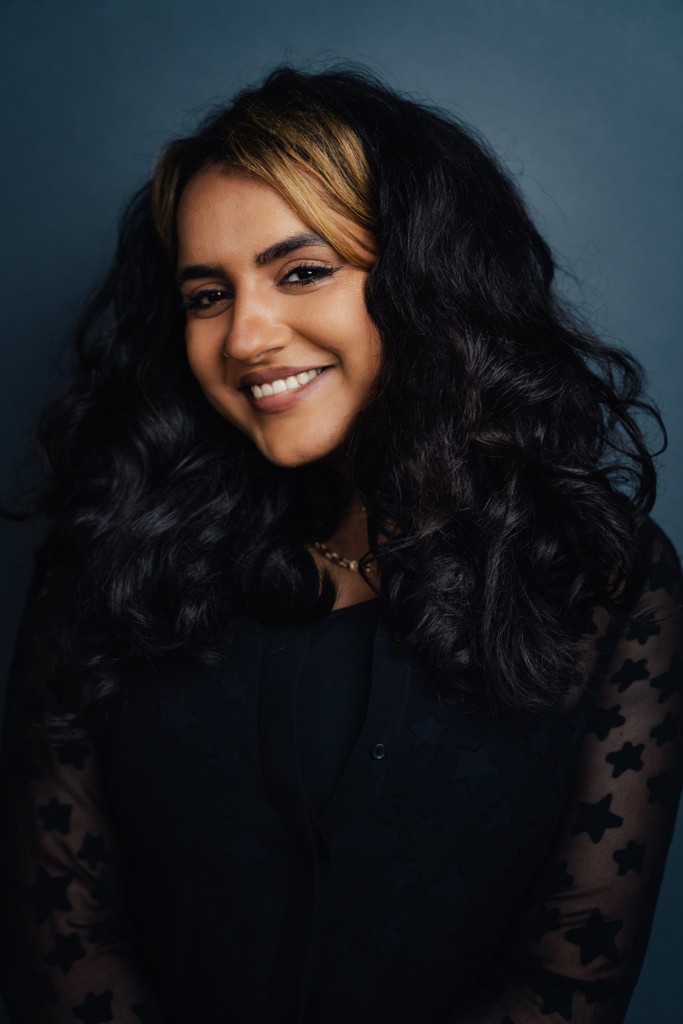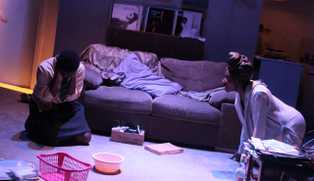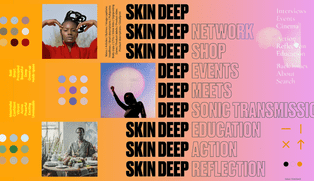This article is part of a mini-season celebrating the return of Black femme theatre.
April 2019. The theatre upstairs at the Royal Court is packed. Two young Black women stand on stage. A delicate white organic structure reaches out above their heads, ominous and ethereal. Across the traverse stage, half the audience sit with their faces bathed in light. They stare back at us, on the other side, seeing us seeing them. None of us were quite prepared for what we would experience that evening, but many, like me, had heard seven methods of killing kylie jenner by Jasmine Lee-Jones was not to be missed.
“I certainly didn’t know what impact this would have when we did it two years ago”, the play’s director Milli Bhatia tells me over the phone. “I knew it was an extraordinary piece of writing. I knew that I’d never, ever read or seen anything like it before. And I knew how immensely privileged I was to be directing it, but I just had no idea of the effect.” As far as new writing in theatre goes, the effect has been profound. seven methods became a mainstream cultural touchstone. A sold-out hit that centres the experiences, cultural references and concerns of young Black women. It spoke to and represented a young audience of colour with authenticity.
The play – which riffs on the socio-cultural maelstrom of the 2019 Forbes tweet proclaiming Kylie-lip-kits-born-into-money-Jenner as the youngest ever self-made billionaire – follows Cleo, an eloquent twitter activist, and her best friend Kara, who eyes the internet and Cleo’s readiness to tweet brutal ways of killing Jenner, with a degree more caution. It’s an incredibly funny and deeply truthful exploration of young friendship, social media, and Jenner’s lucrative appropriation of Blackness, presented in an internet vernacular unlike anything else seen on stage. Following plentiful critical recognition, including an Olivier Award nomination for the play and an Evening Standard Newcomer Award for Lee-Jones (an “extraordinary artist,” Milli tells me. “She’s such a generous collaborator”), it’s now back in the home it began – this time in the larger theatre downstairs. Originally scheduled for 2020, it’s the first play the Royal Court has opened since last March.
But for Milli, remounting a hit show at a time when audiences are theatre-starved didn’t mean resting on their laurels. “You can’t ignore what audiences are going to come into the theatre feeling,” she reflects, when I ask how it felt different this time. “It’s not just that they haven’t sat in the theatre for 465 days [on press night]. It’s to do with what’s happened in the two years since we last did it. It really did feel like we were doing a new play.” The creative team spoke about this new context, “in terms of the way that we now hold grief, how we talk about rage – all these themes in the play. I felt a great responsibility to re-investigate it. We did a lot in rehearsals about what this play means now.”
It undoubtedly means something different now. For one, Forbes suggested in 2020 that tax fraud exaggerated Kylie Jenner’s net worth. Her ubiquity has diminished, as is the way with trend-dependent celebrity. She also has a mixed race toddler now. (Wild. Unsurprising.)
But while Jenner feels more like a stand-in for the wider appropriation-of-blackness influencer problem in 2021, the play’s central and innovative depiction of online communication takes on a more nightmarish proximity. The infamous ‘Twitterludes’, whirlwind sequences where the actors embody and perform deluges of tweets, meme gifs (MJ popcorn eating gif, Jasmine Masters’ ‘and I oop’), hit more closely. Isolated and inside, many have been forced into online front-row seats to participate in the entire world’s outrage. Frankly, it feels like front row at an IMAX sometimes. “We talked about it a lot. I think the way that we’ve had to use and relate to the internet has changed profoundly. The internet has become even more of a tool for activism because a lot of protest, not all of it, has had to exist online.”
Read more: Skin Deep Meets Arinzé Kene
For a time during lockdown, apps like Clubhouse helped Milli to stay informed and connected with activism across the world – but the systemic biases built into these spaces have been just as clear. “Look at these activists in India on the front line that are being censored on twitter because they’re tweeting about the farmers protests. And pro-Palestine tweets being censored.”
In the play, Cleo feels empowered on twitter, using her voice provocatively she goes viral. “[The play] makes such bold, brilliant statements about our agency and complicity in our actions online. It’s actually what Cleo fails to recognise, understanding that your actions online have real life consequences.” Visibility online opens a door to backlash, and the play shows how Black women, dark-skinned ones like Cleo even more so, are targeted by trolls and racists for taking up space in this social wilderness, where responsibility is a comfortable afterthought.
Jasmine Lee-Jones recently described the play as being about how we “process politics”, a succinct description of the play’s core, which questions the merits of voicing dissent online and IRL. Cleo processes by posting. Until it stops being satisfying and gets too real. Under Milli’s direction, with Elena Peña’s daring sound design and live sound manipulation (“she’s a genius, and I don’t say that lightly”), the twitter sequences are overwhelming, fast and brash. It’s a place poised for attention-grabbing statement-making moments, not nuanced discussion.
Conversation was certainly the engine of the rehearsal process, and Milli is effusive about her collaborators, a team of 17 women who understood what it means to exist online. It’s been essential for a play that’s a series of conversations – between Cleo and Kara, between Cleo and the anonymous social internet, between the play and its audience. It asks who should take responsibility for harm, what harm is, and who can get away with it. Cleo’s tweets are violent, but she’s addressing the vast imbalance of power perpetuated by white supremacy and anti-Blackness. It’s hard not to feel a lot more is at stake in these conversations now, with the collective grief we are all carrying.
Want to support Skin Deep and our contributors? Become a member.
Milli mentions the “relief” and silence of the IRL sections. The thinking. The conversations that the two friends have about colourism, anti-Blackness and homophobia are not easy, but at least they evolve IRL, through consideration and reflection. It’s something I hadn’t properly noticed while watching. On the internet, silence is simply absent. You are either saying something or you are not there. The binary has no representational capacity for intermediate states of thinking, processing, or even listening. No wonder many spent the pandemic’s isolation, clinging to their glowing phones like they were the last embers of a fire, typing and posting to keep their heads visible above the digital surface, to remind society and themselves that they mattered.
In the play, the only real progress in conversation comes from Cleo and Kara’s honest disagreements (“Wooooooooow my own bredrin gaslighting me!”), the re-examination of their friendship, and acceptance of their imperfections. “She’s got this really brilliant depiction of a young female friendship,” Milli says about Lee-Jones’ writing, “its messiness, its intricacies… It’s about them learning how to navigate the world as two young Black women, as well as learning how to love and listen to each other. To actually be able to look at each other and ask for accountability and solidarity in their very different experiences.” There are no consequences for the racists and trolls, but the young women hear each other through the din, and grow closer as a result.
It’s engaging to speak to Milli about seven methods. Having spent so long “in” it, she’s interested to hear my reaction too – which I’m grateful for since I feel like I’ve spent too much time telling her how it made me feel. “It is timeless,” she says. “It’s having a conversation that we need to keep having, and in such an extraordinary, profound way. I hope that lots of other people will do it. And I can’t wait to see that.”
And what of the play’s open ending (which I won’t spoil)? I felt that it was asking us a new question this time. “I don’t want to instruct anyone in what it should make them feel, I actually think that’s what has historically made me feel alienated by theatre.” But she felt a contextual shift too. “The ending does feel like a different kind of provocation. ‘Yes you’ve come and supported the work, yes you’ve made a statement about anti-racism or anti-Blackness. But what are you going to do about it?’ I watch that moment now and I go: it’s a question about action.”
June 2021. I’m sitting in the audience. Seeing other audience members. Seeing each other seeing. Being seen. Is this kind of raw visibility and IRL proximity where discomfort and real productive progress happens? Cleo’s words hang with me for a few days after the performance: “you’re making this sooooo deep”. I start to wonder who decides what’s too deep, and what’s not deep enough.
The production of seven methods of killing kylie jenner will be filmed and available for audiences to watch later this year – further information on the public release of this film can be received by signing up to the Royal Court newsletter here.
Stay in touch. Subscribe to Skin Deep’s monthly newsletter.







